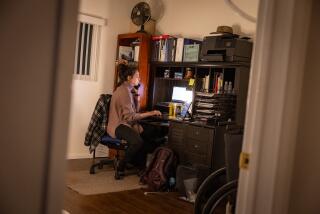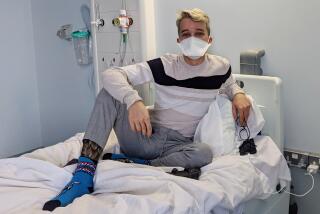10,000 Answer KABC-AM Call for Cancer Volunteers
- Share via
Responding to a novel use of the radio airwaves, more than 10,000 people called talk-radio station KABC-AM (790) Tuesday morning volunteering to serve as subjects for an experimental cancer detection test.
KABC General Manager George Green said he was stunned not only by the size but also by the immediacy of the response. “I didn’t expect to get that many people that quick. . . . We got 5,000 in a half hour,” he said.
Medical experts from UCLA’s John Wayne Cancer Clinic said they took their request for research subjects to the radio because they wanted a large sampling of people on whom they could administer their detection procedure.
They stressed that the test is not yet considered definitive.
“There are many aspects of this that we can only really determine from such a large sample,” said Dr. Donald Morton, who has been working on the procedure for 15 years with Dr. Rishab Gupta.
He and other doctors hope that early detection of cancer could provide victims with earlier treatment and, ultimately, longer lives.
“Our goal with this test is simple: To be able to detect cancer at its earliest stage and at a stage where 90% of people can be cured,” Morton said.
KABC’s Green said the station’s day-long focus on cancer Tuesday had been in the works for three months, since he first heard about the experiments at UCLA.
“We’re trying to demonstrate that radio is more than just controversial b.s.,” Green said. “There’s some good that we can do for the community.”
This will be the first widespread testing of the detection procedure, which isolates antigen--a chemical found in cancer patients--in the urine of patients. The only previous tests have been conducted on cancer patients, in whom antigen was found in higher quantities, according to the John Wayne Cancer Clinic. In all kinds of cancers, antigen is manufactured on the surface of cells.
“If antigens are detected in urine, therefore, it is a virtually certain indicator that cancer is present in the system--even if that cancer is so small that it is still undetectable through conventional diagnostic means,” the clinic said in a press release.
The UCLA clinic said that if the test lives up to its promise, “a routine urine test for cancer could be a standard part of every physical--and the cancer death rate could drop dramatically.”
The test will be conducted by obtaining urine samples from experimental subjects.
Those who test positive for the presence of antigen will be contacted by researchers and informed “in a very tactful manner,” said Gerri Farnell, a spokeswoman for the project. They will be encouraged to contact their own physicians and will undergo further testing by the UCLA researchers.
In an on-air editorial during the Michael Jackson talk show, Green said that “KABC believes this project promises to be one of the most exciting developments in the process to cure cancer.” But in a telephone interview later, he acknowledged that “the test itself is not a sure-fire test for whether you have cancer or not. It’s part of a research experiment.”
UCLA and KABC are seeking a total of 15,000 people to volunteer for testing--with the expectation that many may drop out. To that end, experiment coordinators will go to three shopping malls this week to recruit more subjects. Test kits will be handed out today at Northridge Fashion Center, at Westminster Mall on Thursday and Friday and at the Westside Pavilion on Saturday and Sunday.
More to Read
Sign up for Essential California
The most important California stories and recommendations in your inbox every morning.
You may occasionally receive promotional content from the Los Angeles Times.












